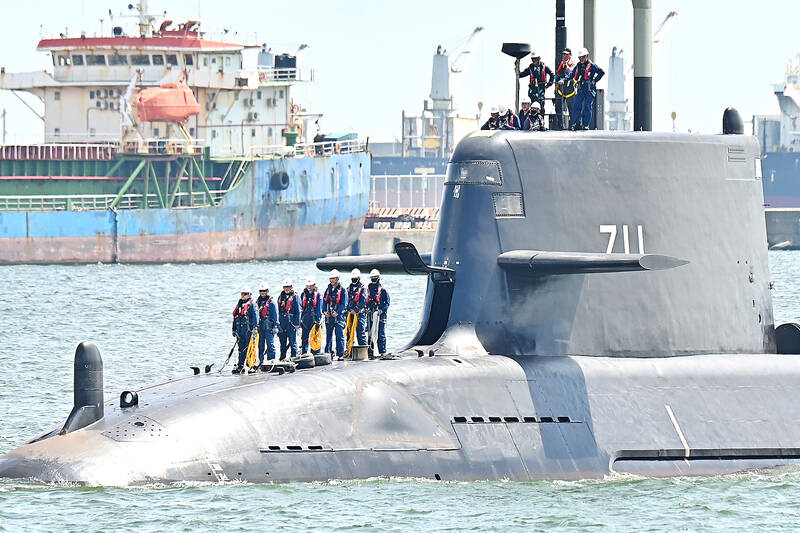After undergoing several sea trials, Taiwan’s first indigenous defense submarine, the SS-711 Hai Kun (海鯤, or Narwhal) is set complete all of its sea acceptance tests by Sept. 30 and be delivered in November on schedule, the navy said yesterday.
Navy Chief of Staff Vice Admiral Chiu Chun-jung (邱俊榮) told a meeting of the legislature’s Foreign Affairs and National Defense Committee that the submarine would undergo three to four surface trials before conducting submerged tests.
Taiwan People’s Party Legislator Lin Yi-chun (林憶君) and Chinese Nationalist Party (KMT) Legislator Hsu Chiao-hsin (徐巧芯) asked about the submarine’s status and testing schedule.

Photo: Lee Hui-chou, Taipei Times
The Hai Kun first left port last week to test its stability while surfaced, Chiu said, adding that tests are proceeding as planned.
Further trials would focus on its stability and performance in different sea conditions, he added.
After surface trials, the submarine would conduct 50m and 200m dive tests, with the goal of completing all sea acceptance tests by Sept. 30 and delivering the vessel in November, Chiu said.
There are 34 test items divided into three stages: surface trials, shallow-water trials and deep-water trials, Minister of National Defense Wellington Koo (顧立雄) said.
Democratic Progressive Party Legislator Puma Shen (沈伯洋) said that rumors about issues with the submarine’s hull were first spread by China’s Voice of Strait in a radio broadcast on Wednesday last week and amplified by Internet commentators.
The media should verify rumors before quoting them and contributing to misinformation, Shen said, adding that the ministry should be quicker to communicate with the public.
Shipbuilder CSBC Corp, Taiwan (台灣國際造船) should also have been speedier in debunking the rumors, he said.
“If the other side engages in this type of behavior, then clarifying the situation more swiftly would help the public,” he said, apparently referring to China.
Koo promised to review and improve the ministry’s communication with the public and the media.
The Hai Kun’s hull does not have any defects and protrusions on it are critical sonar components, Koo said, adding that British and Australian submarines have similar designs.

CHAOS: Iranians took to the streets playing celebratory music after reports of Khamenei’s death on Saturday, while mourners also gathered in Tehran yesterday Iranian Supreme Leader Ayatollah Ali Khamenei was killed in a major attack on Iran launched by Israel and the US, throwing the future of the Islamic republic into doubt and raising the risk of regional instability. Iranian state television and the state-run IRNA news agency announced the 86-year-old’s death early yesterday. US President Donald Trump said it gave Iranians their “greatest chance” to “take back” their country. The announcements came after a joint US and Israeli aerial bombardment that targeted Iranian military and governmental sites. Trump said the “heavy and pinpoint bombing” would continue through the week or as long

TRUST: The KMT said it respected the US’ timing and considerations, and hoped it would continue to honor its commitments to helping Taiwan bolster its defenses and deterrence US President Donald Trump is delaying a multibillion-dollar arms sale to Taiwan to ensure his visit to Beijing is successful, a New York Times report said. The weapons sales package has stalled in the US Department of State, the report said, citing US officials it did not identify. The White House has told agencies not to push forward ahead of Trump’s meeting with Chinese President Xi Jinping (習近平), it said. The two last month held a phone call to discuss trade and geopolitical flashpoints ahead of the summit. Xi raised the Taiwan issue and urged the US to handle arms sales to

BIG SPENDERS: Foreign investors bought the most Taiwan equities since 2005, signaling confidence that an AI boom would continue to benefit chipmakers Taiwan Semiconductor Manufacturing Co’s (TSMC, 台積電) market capitalization swelled to US$2 trillion for the first time following a 4.25 percent rally in its American depositary receipts (ADR) overnight, putting the world’s biggest contract chipmaker sixth on the list of the world’s biggest companies by market capitalization, just behind Amazon.com Inc. The site CompaniesMarketcap.com ranked TSMC ahead of Saudi Aramco and Meta Platforms Inc. The Taiwanese company’s ADRs on Tuesday surged to US$385.75 on the New York Stock Exchange, as strong demand for artificial intelligence (AI) applications led to chip supply constraints and boost revenue growth to record-breaking levels. Each TSMC ADR represents

State-run CPC Corp, Taiwan (CPC, 台灣中油) yesterday said that it had confirmed on Saturday night with its liquefied natural gas (LNG) and crude oil suppliers that shipments are proceeding as scheduled and that domestic supplies remain unaffected. The CPC yesterday announced the gasoline and diesel prices will rise by NT$0.2 and NT$0.4 per liter, respectively, starting Monday, citing Middle East tensions and blizzards in the eastern United States. CPC also iterated it has been reducing the proportion of crude oil imports from the Middle East and diversifying its supply sources in the past few years in response to geopolitical risks, expanding